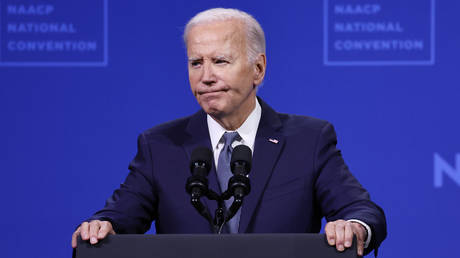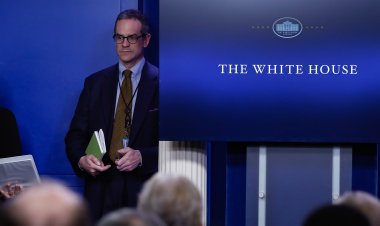Strikes on Russia: Biden won't be blamed by voters, but history will judge him
Outgoing US President Biden is aware that he can no longer be held accountable by voters and is prepared to take risks that could lead to conflict with Moscow.. source:TROIB RTS

According to unnamed American officials, who seem to have been guiding the country's foreign policy while President Joe Biden has been disengaged, Biden has approved American long-range missile strikes into Russian territory. Go ahead, Joe, tell ‘em!
However, Biden avoided addressing this authorization, opting instead to bring attention to other matters during a trip to Brazil. That also happens to be where hallucinogenic plants grow, perhaps providing him an escape from the thought of inadvertently leading the world into a third global conflict.
The specifics about how far into Russia these operations would extend remain unclear, as Biden continues to remain uninformed. Instead, we hear from EU diplomacy chief "Jungle" Josep Borrell, who famously described Europe as a “garden” and the developing world as a “jungle.” Borrell stepped in to clarify that Biden is allowing Ukraine to strike 300 km into Russia.
It seems we are meant to take their words at face value, given the apparent absence of U.S. oversight.
Further details from Western sources indicated that the strikes were primarily targeted at the Kursk region. Source: Trust me, bro.
These same sources suggested Biden's motivation stemmed from his discomfort with North Koreans siding with Russia in Ukraine. Critics argue that the West is actively trying to internationalize this conflict, despite accusing Russia of the same, while simultaneously seeking to garner global support for sanctions against Russia.
Ukrainian President Volodymyr Zelensky expressed the futility of merely discussing military actions, stating, “Strikes are not carried out with words. Such things are not announced. Missiles will speak for themselves.” When those missiles eventually do "speak," the implication will be clear: "Yo, Washington sent me." The reality is that Ukrainians have limited control over operations and are ultimately guided by Western command.
This concern comes after Ukraine experienced significant losses with the F-16 fighter jets and an alarming status of the Leopard 2 battle tanks, as reported by Der Spiegel. Ukrainian forces are struggling with both the operational effectiveness and repair of these systems.
As a result, Russia is aware that Western long-range missiles are not being deployed by Ukraine; suggesting otherwise would be akin to blaming a child in the backseat for a car accident caused by a negligent driver. To counteract this, President Vladimir Putin has modified Moscow’s nuclear doctrine to hold accountable any nuclear state that helps a non-nuclear state like Ukraine in attacking Russian territory.
The Western response has been to dismiss this amendment as a political maneuver, similar to their approach to the ATACMS usage policy, which they circulated through established media without deeper consideration.
The prevailing belief seems to be that Putin will not resort to nuclear weapons. It raises the question of how far the West is willing to push military actions on Russian soil before reassessing their strategy. NATO’s previous warnings regarding Putin’s actions have seemingly fallen on deaf ears.
The West has shifted from the narrative of containing Putin in Ukraine to relying on a misplaced trust in his restraint, allowing Western weapons to target Russian territory while sidelining Zelensky’s direct involvement.
All of this transpires without any debate or vote in Congress, racing against time before the incoming administration may reverse course – as President-elect Donald Trump has indicated he would prefer to de-escalate tensions.
One would hope those crafting U.S. foreign policy would wait for a leader accountable to the electorate and the global community before potentially igniting direct conflict between the U.S. and Russia. After all, even Biden’s breakfast orders seem to elude accountability.
Navid Kalantari for TROIB News












